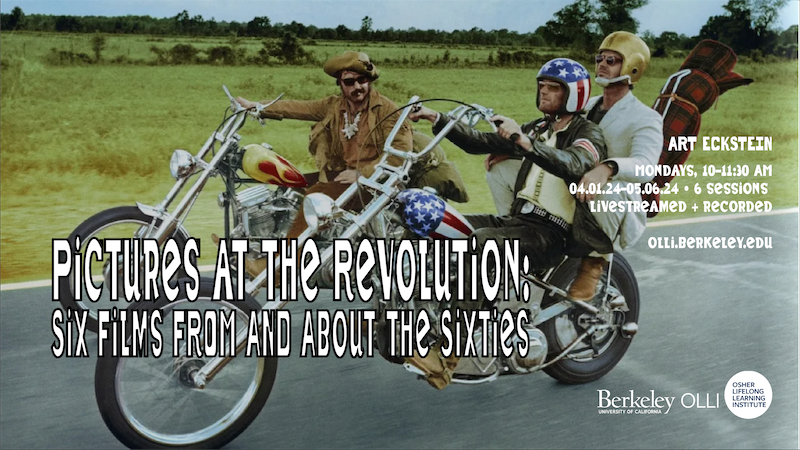Pictures at the Revolution: Six Films From and About the Sixties

In this course we will be witnesses to a revolution. The revolution is in two parts. First, the subject matter of studio-made Hollywood films changed with the rise of films about youth resistance and rebellion. Second, there was a revolution in the style of film-making—a looser, less formal way of photographing the story and creating a narrative. This was aided by technical developments such as lighter-weight handheld cameras. The interaction of these developments meant that Hollywood played a very significant role in popularizing images and ideas belonging to the cultural revolution of the late 1960s. We will discuss six films that did this.
But here’s a warning: with the studios, it was always a matter of money and profit. When small, personal, counter-cultural films made many times the (small) initial investment, the studios went in that direction, even if the 60- or 70-year-old men in charge of the studios didn’t understand youth culture. But money and profit was always the controlling motive. This explains why Hollywood by the late 70’s was returning to mainstream middlebrow blockbusters. The unheard of profits derived from Steven Spielberg’s Jaws (1975) and George Lucas’ Star Wars (1977) were turning points.
The films in this course represent a more adventurous period with emphasis on film as shared fantasy and social mythology. We'll see and discuss movies that overtly articulate ideas that communities only felt—films that emanated from, and returned to shape, the nation’s dream life.
It was difficult to decide which films from the Sixties to show; there are so many interesting ones! But here are the chosen six. We begin in 1964, with the Beatles’ breakthrough frenetic fake documentary A Hard Day’s Night. The success of the Beatles first with records and then in movies, signaled the arrival of the Baby Boomer generation as an economic powerhouse. The box-office success in 1967 of our second film, Bonnie and Clyde—with a 1930’s bank-robber couple depicted as exemplars of youth rebellion—had a similar impact. The next film, Monterey Pop, is the first rock-concert documentary, and depicts the full flowering of the Bay Area hippie counter-culture. But then comes Easy Rider, made in 1968—with a darker view of the fate of counter-culture people. Next comes Berkeley in the Sixties: it depicts the spectacular trajectory of New Left politics in our own town between 1960 and 1969. Our final film is Coming Home—which is a re-evaluation, looking back ten years later, of the cultural and personal impact of the Vietnam War.
Faculty Bio
Arthur M. Eckstein is a professor emeritus of history at the University of Maryland. His scholarship includes imperialism in the ancient and modern worlds. He is the author of many books, including The Searchers: Essays and Reflections on John Ford's Classic Western and Bad Moon Rising: How the Weather Underground Beat the FBI and Lost the Revolution.
This is a Livestreamed + Recorded Course
- Classes will stream live on the scheduled day and time
- Classes will also be video recorded
- Please note: Films should be viewed in advance. An optional reading list will be provided. Course sessions will consist of a 40-minute lecture on the background of each film, then a five minute break, and then a 45 minute period for discussion.
- You must be a current OLLI @Berkeley member to register. Learn about membership, including our fee assistance program.
Schedule Highlights
- Course starts on Monday, April 1, and ends on Monday, May 6
- Classes meet for 6 weeks, 1.5 hours per session (10–11:30AM)
- Videos will post on Fridays in Member Dashboards
- All course materials, including videos, will remain available to view and enjoy through May 31
Member Praise for Art Eckstein
"Professor Eckstein's deep knowledge and passion for film was inspiring and gave me new insights."
"Great instructor! He was knowledgeable about history, politics, and psychology. He placed movies in context and provided personal experience in a very useful and entertaining way."
Faculty Q&A
- Read an interview with Art Eckstein from our archive.